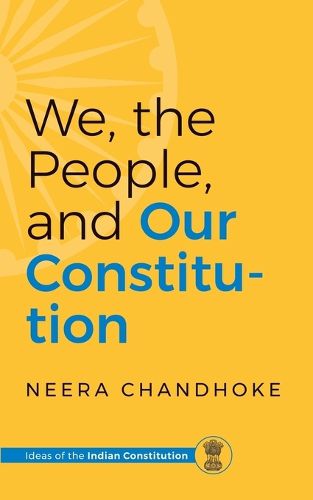Readings Newsletter
Become a Readings Member to make your shopping experience even easier.
Sign in or sign up for free!
You’re not far away from qualifying for FREE standard shipping within Australia
You’ve qualified for FREE standard shipping within Australia
The cart is loading…






This title is printed to order. This book may have been self-published. If so, we cannot guarantee the quality of the content. In the main most books will have gone through the editing process however some may not. We therefore suggest that you be aware of this before ordering this book. If in doubt check either the author or publisher’s details as we are unable to accept any returns unless they are faulty. Please contact us if you have any questions.
The foundational ideas of Indian democracy-fraternity, equality, secularism,
justice-are not alien concepts. As this book shows, from the earliest attempt
with the 'Constitution of India Bill' in 1895, whose authorship is unknown,
to the 1925 Commonwealth of India Bill, the Motilal Nehru Constitutional
Draft of 1928 and various Congress resolutions to the Constituent Assembly
of 1946, we see these basic ideas reiterated again and again. With the adoption
of the Constitution, 'we, the people' merely affirmed our faith in an idea of
freedom that thousands of Indians had fought and died for.
Among the many distinguishing features of our Constitution is the role it
has played in realizing the promises of the freedom struggle. We see how,
creative interpretations by the judiciary aside, it has provided the blueprint for
interventions by civil society to protect the citizen from both the brazenness
of political power as well as the uncertainties of a developing economy. No
wonder, then, that in the decades since Independence, the Constitution has
become our very identity as Indians. For all its shortcomings, it has held our
democracy together, and the people have, likewise, stepped up in its defence
when needed, like they did in 2019 to protest the ominous amendments to
the Citizenship Act.
In this lucid yet passionately argued essay, distinguished scholar of political
science Neera Chandhoke shows us why our Constitution is as much a
political and moral document as it is a legal one, and as Indian as the republic
it created.
$9.00 standard shipping within Australia
FREE standard shipping within Australia for orders over $100.00
Express & International shipping calculated at checkout
This title is printed to order. This book may have been self-published. If so, we cannot guarantee the quality of the content. In the main most books will have gone through the editing process however some may not. We therefore suggest that you be aware of this before ordering this book. If in doubt check either the author or publisher’s details as we are unable to accept any returns unless they are faulty. Please contact us if you have any questions.
The foundational ideas of Indian democracy-fraternity, equality, secularism,
justice-are not alien concepts. As this book shows, from the earliest attempt
with the 'Constitution of India Bill' in 1895, whose authorship is unknown,
to the 1925 Commonwealth of India Bill, the Motilal Nehru Constitutional
Draft of 1928 and various Congress resolutions to the Constituent Assembly
of 1946, we see these basic ideas reiterated again and again. With the adoption
of the Constitution, 'we, the people' merely affirmed our faith in an idea of
freedom that thousands of Indians had fought and died for.
Among the many distinguishing features of our Constitution is the role it
has played in realizing the promises of the freedom struggle. We see how,
creative interpretations by the judiciary aside, it has provided the blueprint for
interventions by civil society to protect the citizen from both the brazenness
of political power as well as the uncertainties of a developing economy. No
wonder, then, that in the decades since Independence, the Constitution has
become our very identity as Indians. For all its shortcomings, it has held our
democracy together, and the people have, likewise, stepped up in its defence
when needed, like they did in 2019 to protest the ominous amendments to
the Citizenship Act.
In this lucid yet passionately argued essay, distinguished scholar of political
science Neera Chandhoke shows us why our Constitution is as much a
political and moral document as it is a legal one, and as Indian as the republic
it created.